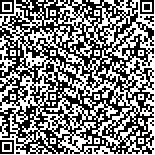本文已被:浏览 929次 下载 526次
Received:December 11, 2019 Published Online:September 20, 2020
Received:December 11, 2019 Published Online:September 20, 2020
中文摘要: 目的 检测β-catenin及淋巴细胞结合增强因子(LEF)1蛋白在食管鳞癌中的表达及食管癌放疗疗效之间的关系,初步探讨上述基因发挥作用的分子通路。方法 选择2010年1月至2016年12月就诊的59例食管鳞癌患者,均为不能接受手术的局部晚期患者,经穿刺或诊断性手术诊断为食管鳞癌,接受根治性放疗。采用免疫组化法检测上述食管癌组织细胞中β-catenin及LEF1蛋白的表达。应用χ2检验分析β-catenin及LEF1表达情况与患者近期放疗疗效的关系,应用Spearman相关性分析β-catenin及LEF1表达是否存在相关性。结果 在食管鳞癌组织中β-catenin蛋白主要表达在胞质及胞核,LEF1蛋白主要表达在胞核。食管鳞癌组织中β-catenin 蛋白在胞浆+胞核中的阳性表达率在近期放疗有效组和无效组中差异无统计学意义(χ2=0.83,P=0.36);β-catenin 蛋白在胞核中阳性表达率在近期放疗有效组和无效组中表达差异具有统计学意义(χ2=4.91,P=0.03)。LEF1蛋白胞核中阳性表达率在近期放疗无效组和有效组差异有统计学意义(χ2=6.11,P=0.01)。β-catenin表达与LEF1胞核阳性表达呈正相关关系(rs=0.81,P<0.01)。结论 食管癌放射抵抗中可能存在Wnt通路上活化,β-catenin发生核聚集后激活胞核中LEF1,从而激活下游功能原件,发挥放射抵抗作用,从而影响食管癌的近期疗效。
中文关键词: β-连环蛋白 淋巴细胞结合增强因子1 Wnt通路 食管癌 放射抵抗
Abstract:Objective To detect the expressions of β-catenin and lymphoid enhancer-binding factor 1(LEF1) in esophageal squamous cell carcinoma (ESCC) tissues to investigate the relationship between their expression and the efficacy of radiotherapy and primarily explore the molecular signaling pathway of above gene functions. Methods Fifty-nine patients with locally advanced ESCC confirmed by biopsy and received radical radiotherapy from January 2010 to December 2016 were selected and divided into effective group and ineffective group.The expressions of β-catenin and LEF1 protein in esophageal carcinoma cells were detected by immunohistochemistry.Chi square test was used to analyze the associations of the expressions of β-catenin and LEF1 with the short-term efficacy of radiotherapy.Spearman correlation was used to analyze the relationship between β-catenin and LEF1. Results β- catenin was mainly expressed in cytoplasm and nucleus, while LEF1 protein was mainly expressed in nucleus.There was no significant difference in the positive expression rate of β-catenin in cytoplasm and nucleus between effective group and ineffective group (χ2=0.83, P=0.36), but there was statistical difference in it in nucleus between two groups(χ2=4.91, P=0.03).There was statistical difference in positive expression rate of LEF1 protein between two groups (χ2=6.11, P=0.01).There was a positive correlation between β-catenin expression and LEF1 expression (rs=0.81, P<0.01). Conclusion Activation of Wnt pathway may exist in the radiation resistance of esophageal cancer.β-catenin can activate LEF1 in the nucleus after nuclear aggregation, which can activate downstream components and play a role in radiation resistance, thus affecting the short-term efficacy of radiotherapy in ESCC patients.
keywords: β-catenin Lymphoid enhancer-binding factor 1 Wnt pathway Esophageal cancer Radiation resistance
文章编号: 中图分类号: 文献标志码:A
基金项目:唐山市科技局计划项目 (17130238a)
| Author Name | Affiliation |
| HUANG Xiao-zhi, XIONG Wei, LIU Yang, YI Xuan-hong | Department of Radiochemistry, Tangshan People′s Hospital, Tangshan, Hebei 063000, China |
| Author Name | Affiliation |
| HUANG Xiao-zhi, XIONG Wei, LIU Yang, YI Xuan-hong | Department of Radiochemistry, Tangshan People′s Hospital, Tangshan, Hebei 063000, China |
引用文本:
